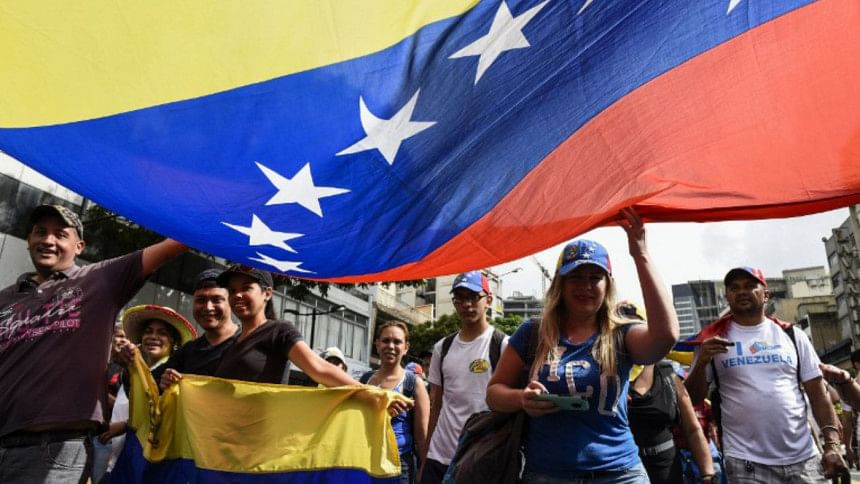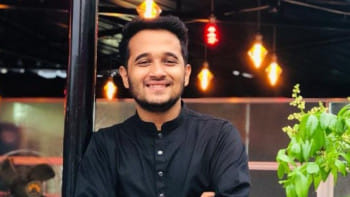The invisible people of Venezuela

Venezuela is in a limbo. The country has two presidents fighting over legitimacy; two superpowers eying its rich oil fields and gold mines; an economy that is on the verge of collapse with inflation reaching one million percent and external debt shattering the roof at more than 175 percent of GDP; and an unfolding humanitarian crisis that has forced more than three million people to flee to neighbouring countries seeking refuge.
Both Nicolas Maduro and Juan Guaido, the embattled presidents of Venezuela, are prepared to go to any length to legitimise their office; both are calling on the people to come to their support. In fact, Guaido on many occasions called on the people of Venezuela to take to streets in support of him, to bring the downfall of Maduro.
But where are the people of Venezuela? Why have they not taken to the streets in a show of support for Guaido, to bring an end to the "failed" regime of the authoritarian Maduro?
The anti-Maduro Venezuelans did indeed gather the courage to rise against the failures of Maduro, and protests had been staged countrywide between January 21 and 25, especially in the impoverished areas where the residents had been badly affected due to the collapse of the economy and the government institutions. In retaliation, the Venezuelan military, along with the Bolivarians, resorted to violent means and coercion to strike fear in the hearts of the protesters. According to an Amnesty International report, more than 900 were arbitrarily arrested during the January protests.
As if this wasn't enough, Amnesty International has also recorded six cases of extrajudicial killings by the Bolivarian National Police (PNB) through their Special Actions Force (FAES), in the aftermath of the mass protests. All the six victims had been associated with the protests, and their criticism of Maduro had gone viral on social networks. To give these killings a veneer of justice, these young boys were portrayed as "delinquents" who had been killed in crossfire with law enforcement authorities.
The Venezuelan military along with the Bolivarians—direct beneficiaries of the Chavez-Maduro administrations—staunchly support Maduro. Chavez and later Maduro have empowered these armed institutions by giving them authority over key state assets, including oil fields and gold mines, and have also granted them control of certain ministries and government institutions, which have enabled these groups to grow rich and prosperous. With the fall of Maduro, their fall would also be inevitable, making the threat posed by Guaido an existential one—both on a philosophical and practical level.
In addition to empowering the military, the Chavez-Maduro administrations have also armed small "community organisations" known as the "colectivos". These armed groups have a strong presence throughout Venezuela, especially in low-income areas where people are mostly poor and have to live off the state-sponsored staple food distribution programme. These groups are also known to be carrying out illegal drug business with impunity, with the blessing, tacit or implicit, of the Maduro regime. It is highly unlikely that they would side with Guaido, or allow the people of their communities to support him.
The handful of military officers who had sided with Guaido on May 1, to stage a coup d'état and oust Maduro from power, including opposition leader Leopoldo Lopez, have been reduced to seeking shelter in foreign embassies in Venezuela to avoid Maduro regime's persecution.
The prevailing anti-US sentiment is another key piece in this puzzle. The United States have a troubled history in Latin America, with accusations of the US interfering in the national politics of many Latino countries written in bold in Latin American history. Throughout the Cold War, the US had directly intervened in Chile, Nicaragua and Guatemala, among other countries, to push out leftist governments from power. The 1973 bombing of the La Modena palace in Chile during a coup d'état, which led to the death of President Allende, only confirmed people's distrust of America and its interest in the region—a sentiment that remains as a lasting artefact from a trouble era.
And one can recall the recent revelation in FBI Director Andrew McCabe's book, The Threat: How the FBI Protects America in the Age of Terror and Trump, regarding President Trump's outlook on Venezuela where he hints to his intel team that America should go to war with Venezuela because they are rich in oil, "Why are we not at war with Venezuela? They have all that oil and they're right on our back door." Such rhetoric, along with repeated statements from the US government saying "all options are on the table", suggesting a possible military intervention in Venezuela, do not help the confidence of the silent majority.
With many Venezuelans seeing Guaido as an American puppet, his recent comment during an interview with CBS News—that he might be open to US military intervention in Venezuela, "We are open to options that offer a low social cost and that will grant us the ability and the stability to hold a truly free election ... We want the best exit out of this conflict, and if there are options we have to consider and alternatives, then we will"—reflects doubt on his intentions.
The nationalists, who subscribe to the Chavista ideology, are not inclined to support a man who would potentially pave way for the Americans to set foot on Venezuelan soil. The Wall Street Journal's revelation that Mike Pence had called Guaido the night before he declared himself the interim president of Venezuela, pledging US support and assistance, should he choose to invoke Article 233 of the Venezuelan constitution, only goes to show Guaido's cosy relationship with the US and undermines his eligibility to become the leader of the people—interim or permanent.
There is no revolution in Venezuela; no uprising. Guaido's repeated failed calls to the people to come down to streets to overthrow the government of Maduro only go on to show the fear instilled in the hearts and minds of the people by Maduro and his allies, and their distrust in Guaido and his intentions. The common people, the worst victims of the spiralling humanitarian crisis, are nowhere to be seen on the streets calling for change. If it is just the attempt of a minority of Venezuelans to overthrow Maduro, and see a government in power with a new alignment, what will remain to be seen is who will gain from this struggle for "change".
Tasneem Tayeb works for The Daily Star. She can be reached through her Twitter handle: @TayebTasneem.

 For all latest news, follow The Daily Star's Google News channel.
For all latest news, follow The Daily Star's Google News channel. 



Comments